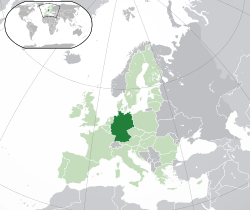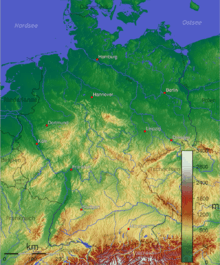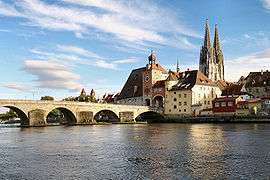Outline of Germany


The following outline is provided as an overview of and topical guide to Germany:
Germany – federal parliamentary republic in western-central Europe consisting of 16 constituent states, which retain limited sovereignty. Its capital and largest city is Berlin. With more than 80 million inhabitants, it is the most populous member state in the European Union. Germany is a major economic and political power of the European continent and a historic leader in many cultural, theoretical and technical fields. After losing World War I, Germany fell under the control of Adolf Hitler, who started World War II. After losing World War II, Germany was divided into East Germany and West Germany, each on opposite sides in the Cold War. In October 1990, after the Cold War ended, the country was reunified. Germany has since grown to become the world's fourth-largest economy by nominal GDP.
General reference

- Pronunciation:
 i/ˈdʒɜːrməni/; (German: Deutschland; German pronunciation: [ˈdɔʏtʃlant]), the Federal Republic of Germany (German: Bundesrepublik Deutschland, German pronunciation: [ˈbʊndəsʁepuˌbliːk ˈdɔʏtʃlant])
i/ˈdʒɜːrməni/; (German: Deutschland; German pronunciation: [ˈdɔʏtʃlant]), the Federal Republic of Germany (German: Bundesrepublik Deutschland, German pronunciation: [ˈbʊndəsʁepuˌbliːk ˈdɔʏtʃlant]) - Common English country name: Germany
- Official English country name: The Federal Republic of Germany
- Common endonym(s): Deutschland
- Official endonym(s): Bundesrepublik Deutschland
- Adjectival(s): German
- Demonym(s): Germans
- Etymology: Name of Germany
- International rankings of Germany
- ISO country codes: DE, DEU, 276
- ISO region codes: See ISO 3166-2:DE
- Internet country code top-level domain: .de
Geography of Germany

Germany is bordered to the north by the North Sea, Denmark, and the Baltic Sea; to the east by Poland and the Czech Republic; to the south by Austria and Switzerland; and to the west by France, Luxembourg, Belgium, and the Netherlands. The territory of Germany covers 357,021 square kilometres (137,847 sq mi) and is influenced by a temperate seasonal climate.
- Germany is a:
- Location:
- Northern Hemisphere and Eastern Hemisphere
- Time in Germany
- Extreme points of Germany (major towns):[1]
- North: Westerland (on the island of Sylt at the Danish border)
- South: Oberstdorf, town at Austria[2]
- East: Goerlitz, town at Poland
- West: Aachen, town at Belgium & the Netherlands
- High: Zugspitze 2,962 m (9,718 ft)
- Low: Neuendorf bei Wilster −3.5 m (−11 ft)
- Coastline: 2,389 km (1,484 mi)
- Population of Germany: 82,217,800 people (2007 estimate) – 14th most populous country
- Area of Germany: 357,021 km2 (137,847 sq mi) – 63rd largest country
- Atlas of Germany
- List of cities and towns in Germany
Neighbours of Germany
Land boundaries: 3,621 km (2,250 mi)
 Austria 784 km (487 mi)
Austria 784 km (487 mi) Czech Republic 646 km (401 mi)
Czech Republic 646 km (401 mi) Netherlands 577 km (359 mi)
Netherlands 577 km (359 mi) Poland 456 km (283 mi)
Poland 456 km (283 mi) France 451 km (280 mi)
France 451 km (280 mi) Switzerland 334 km (208 mi)
Switzerland 334 km (208 mi).svg.png) Belgium 167 km (104 mi)
Belgium 167 km (104 mi) Luxembourg 138 km (86 mi)
Luxembourg 138 km (86 mi) Denmark 68 km (42 mi)
Denmark 68 km (42 mi)
Environment of Germany

- Climate of Germany
- Green building in Germany
- Renewable energy in Germany
- Geology of Germany
- National parks of Germany
- Protected areas of Germany
- Wildlife of Germany
- Fauna of Germany
Geographic features of Germany
- Glaciers of Germany
- Islands of Germany
- Lakes of Germany
- Mountains of Germany
- Rivers of Germany
- Valleys of Germany
- World Heritage Sites in Germany
Administrative divisions of Germany
States of Germany
Germany is composed of 16 constituent states, called Bundesländer (see map on the right).
Further subdivisions
- Some German states are subdivided into administrative regions, called Regierungsbezirke.
- Germany as a whole is further composed of approx. 400 districts, separated into:
- "Rural" districts (Landkreise or Kreise) and
- "Urban" districts (Kreisfreie Städte or Stadtkreise)
- Cities of Germany
- Municipalities of Germany
Demography of Germany
With over 82 million inhabitants, it comprises the largest population among the member states of the European Union and is home to the third-highest number of international migrants. See more at Immigration to Germany.
Government and politics of Germany
- Form of government: federal parliamentary representative democratic republic
- Capital of Germany: Berlin
- Former Capital of West Germany and later seat of government of the reunified Federal Republic: Bonn
- Federal budget of Germany
- Elections in Germany
- Far-right politics in Germany
- Federalism in Germany
- Political parties in Germany
- Political scandals of Germany
- Security issues in Germany
- Taxation in Germany
Branches of the government of Germany
Executive branch of the government of Germany
Legislative branch of the government of Germany
Judicial branch of the government of Germany
- Supreme Court of Germany
- Federal Administrative Court of Germany
- Federal Constitutional Court of Germany
- Federal Court of Justice of Germany
- Federal Finance Court of Germany
- Federal Labour Court of Germany
- Federal Patent Court of Germany
- Federal Social Court of Germany
Foreign relations of Germany
- List of diplomatic missions in Germany
- List of diplomatic missions of Germany
- Embassy of Germany, Abuja
- Embassy of Germany, Bangkok
- Embassy of Germany, Brasília
- Embassy of Germany, Budapest
- Embassy of Germany, Canberra
- Embassy of Germany, Chișinău
- Embassy of Germany, Kiev
- Embassy of Germany, London
- Embassy of Germany, Moscow
- Embassy of Germany, Ottawa
- Embassy of Germany, Prague
- Embassy of Germany, Saint Petersburg
- Embassy of Germany, Tel Aviv
- Embassy of Germany, Washington, D.C.
- Embassy of Germany, Wellington
- Embassy of Germany, Windhoek
International organization membership
The Federal Republic of Germany is a member of:[3]
Law and order in Germany
- Laws in Germany
- Crime in Germany
- Human rights in Germany
- Law enforcement in Germany
- National law enforcement agencies
- Regional law enforcement agencies
- Landespolizei – are operated by individual German states and are responsible for the bulk of police work in Germany
- Landespolizei forces are divided into the following operational sections:
- Schutzpolizei – ('Schupo') The uniformed police officers who patrol the streets, respond to emergency calls, do traffic policing etc.
- Kriminalpolizei – ('Kripo') The plain clothes detective branch of the State police, responsible for investigations. For instance, if a car is broken into, the Schupo will respond, secure the car, notify the owner etc., and then hand the case over to Kripo for investigation.
- Einsatzhundertschaften (EHU) / Bereitschaftspolizei (BePo) – Uniformed part of the LaPo that is used when manpower is required, for example during political demonstrations.
- Landeskriminalamt (LKA) – The State Investigation Bureau is directly subordinate to the state ministry of the interior, supervises police operations aimed at preventing and investigating criminal offences, and coordinates investigations involving more than one Präsidium.
- Wasserschutzpolizei (WSP) – The river police for patrolling rivers, lakes and harbours.
- Spezialeinsatzkommando (SEK) – The SWAT teams of the German state police.
- Autobahnpolizei – The highway patrol or motorway police in Germany.
Military of Germany
- Command
- Commander-in-chief:
- Bundeswehr
- Army of Germany: Heer
- Navy of Germany: Marine
- Air force of Germany: Luftwaffe
- Special forces of Germany: Kommando Spezialkräfte
- Military history of Germany
- Military ranks of Germany
History of Germany
History of Germany, by period
Years in Germany
- 1871- 1872- 1873- 1874- 1875- 1876- 1877- 1878- 1879- 1880- 1881- 1882- 1883- 1884- 1885- 1886- 1887- 1888- 1889- 1890- 1891- 1892- 1893- 1894- 1895- 1896- 1897- 1898- 1899- 1900- 1901- 1902- 1903- 1904- 1905- 1906- 1907- 1908- 1909- 1911- 1912- 1913- 1914- 1915- 1916- 1917- 1918- 1919- 1920- 1921- 1922- 1923- 1924- 1925- 1926- 1927- 1928- 1929- 1930- 1931- 1932- 1933- 1934- 1935- 1936- 1937- 1938- 1939- 1940- 1941- 1942- 1943- 1944- 1945- 1946- 1947- 1948- 1949- 1950- 1951- 1952- 1953- 1954- 1955- 1956- 1957- 1958- 1959- 1960- 1961- 1962- 1963- 1964- 1965- 1966- 1967- 1968- 1969- 1970- 1971- 1972- 1973- 1974- 1975- 1976- 1977- 1978- 1979- 1980- 1981- 1982- 1983- 1984- 1985- 1986- 1987- 1988- 1989- 1990- 1991- 1992- 1993- 1994- 1995- 1996- 1997- 1998- 1999- 2000- 2001- 2002- 2003- 2004- 2005- 2006- 2007- 2008- 2009- 2010- 2011- 2012- 2013- 2014- 2015- 2016- 2017- 2018- 2019
History of Germany, by subject
- List of historic states of Germany
- List of historical political parties in Germany
- Military history of Germany
Culture of Germany

- Architecture of Germany
- Cuisine of Germany
- Festivals in Germany
- German humour
- Languages of Germany
- Media in Germany
- Museums in Germany
- National symbols of Germany
- Philosophy in Germany
- Prostitution in Germany
- Public holidays in Germany
- Records of Germany
- Scouting and Guiding in Germany
- World Heritage Sites in Germany
Art in Germany
- Art in Germany
- Cinema of Germany
- Cuisine of Germany
- Fashion of Germany
- Literature of Germany
- Made in Germany
Music of Germany
People of Germany
- Afghans in Germany
- Ahmadiyya in Germany
- Albanians in Germany
- Americans in Germany
- Arabs in Germany
- Armenians in Germany
- Asians in Germany
- Assyrians/Syriacs in Germany
- Azerbaijanis in Germany
- Brazilians in Germany
- Bulgarians in Germany
- Chinese people in Germany
- Croatians in Germany
- Filipinos in Germany
- Georgians in Germany
- Greeks in Germany
- Hungarians in Germany
- Indians in Germany
- Iranians in Germany
- Iraqis in Germany
- Islamic Community of Germany
- Italians in Germany
- Kurds in Germany
- Lebanese people in Germany
- List of Lebanese people in Germany
- Macedonians in Germany
- Russians in Germany
- Serbs in Germany
- Tjaskers in Germany
- Turks in Germany
- Ukrainians in Germany
- Vietnamese people in Germany
- Yazidis in Germany
Religion and belief systems in Germany
- Irreligion in Germany
- Religion in Germany
- Freedom of religion in Germany
- Religions in Germany
Sports in Germany
- American Football Association of Germany
- Athletics in Germany
- Auto racing in Germany
- Basketball in Germany
- Bodybuilding in Germany
- Cricket in Germany
- Football in Germany
- Australian rules football in Germany
- Football records in Germany
- Footballer of the Year in Germany
- Foreign football players in Germany
- List of American football teams in Germany
- List of Germany Davis Cup team representatives
- List of Germany international footballers
- List of Germany international footballers 1908–1942
- List of football clubs in Germany
- List of football clubs in Germany by major honours won
- List of football stadiums in Germany
- Women's football in Germany
- Germany at the Olympics
- German records in athletics
- Ice hockey in Germany
- Roller derby in Germany
- Rugby in Germany
- Sports broadcasting contracts in Germany
Economy and infrastructure of Germany
Germany was the largest exporter of goods in 2007. In absolute terms, Germany allocates the second biggest annual budget of development aid in the world,[4] while its military expenditure ranked sixth.[5] The country has developed a high standard of living and established a comprehensive system of social security.
- Economic rank, by nominal GDP (2007): 4th (fourth)
- Agriculture in Germany
- Central banks
- Communications in Germany
- Companies of Germany
- Currency of Germany: Euro (see also: Euro topics)
- Economic history of Germany
- Mining in Germany
- Mittelstand
- Stock exchange: Frankfurt Stock Exchange
- Tourism in Germany
- Transport in Germany
- Water supply and sanitation in Germany
- Wirtschaftswunder
Energy in Germany
- Electricity sector in Germany
- Geothermal power in Germany
- List of power stations in Germany
- Energy transition in Germany
- Nuclear power in Germany
- Solar power in Germany
- Wind power in Germany
Education in Germany
- Academic achievement among different groups in Germany
- Academic grading in Germany
- Academic ranks in Germany
- Science and technology in Germany
- Universities in Germany
- List of schools in Germany
- Music schools in Germany
- State libraries of Germany
- Student loans in Germany
Health in Germany
See also
| German language edition of Wikipedia, the free encyclopedia |
- Index of Germany-related articles
- List of Germany-related topics
- List of international rankings
- Member state of the European Union
- Member state of the Group of Twenty Finance Ministers and Central Bank Governors
- Member state of the North Atlantic Treaty Organization
- Member state of the United Nations
- Outline of Europe
- Outline of geography
References
- ↑ Map of Germany, SitesAtlas.com, 2009, web: SitA-511.
- ↑ "Ryan Jahnke Online", FigureskatersOnline.com, 2009, web: FSO-RJah.
- ↑ "Germany". The World Factbook. United States Central Intelligence Agency. 2009-07-14. Retrieved 2009-07-23.
- ↑ Germany world's second biggest aid donor after US TopNews, India, Retrieved 2008, 04-10.
- ↑ "The fifteen major spenders in 2006" (PDF). Recent trends in military expenditure. Stockholm International Peace Research Institute. 2007. Archived from the original (PDF) on 2007-08-14. Retrieved 2007-08-23.
External links
General
- Deutschland.de — Official German portal
- Germany Tourism
- German news and features, Expatica
- DW-WORLD.DE Deutsche Welle — Germany's international broadcaster
- News Portal of the German Embassy to the USA
- "History of Germany since 1945" (PDF). (1.28 MB)
Facts and figures
- CIA statistics
- Facts about Germany — by the German Federal Foreign Office
- Destatis.de — Federal Statistical Office Germany (English)
Travel
-
 Germany travel guide from Wikivoyage
Germany travel guide from Wikivoyage - Germany Travel Info — by the German National Tourist Office
Pictures
- Database of travelers' photos sorted by region (fotocommunity)


.svg.png)
.jpg)